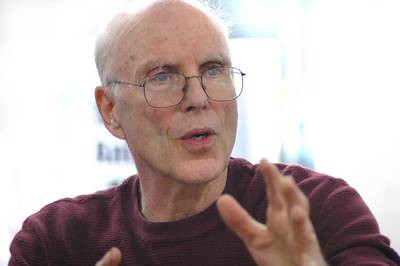Fred Goldstein talks of his new book Low-Wage Capitalism with a compelling analysis of global corporate capitalism, a system demonstrably unfair, irrational, and painfully unstable.
Low-Wage Capitalism describes in sweeping detail the drastic effect on the working class in the United States of new technology and the restructuring of global capitalism in the post-Soviet era. It uses Karl Marx's law of wages and other findings to show that these developments are not only continuing to drive down wages but are creating the material basis for future social upheaval.
The analysis rests on three basic developments in the last three decades:
While the book concentrates on changes in the U.S., restructuring is a world phenomenon. Goldstein's general analysis also applies to the imperialist countries of Western Europe and Japan. The book discusses how:
- The world's workforce available to exploitation by transnational capitalist corporations doubled in the wake of the collapse of the USSR and Eastern Europe.
- The technological revolutions of the digital age, in both production and communications, have allowed transnational corporations to destroy high-wage jobs and simultaneously expand the global workforce to generate a worldwide wage competition.
- The decline in the economic condition of the workers, driven by the laws of capitalism and the capitalist class, is leading to the end of working-class compromise and retreat and must end up in a profound revival of the struggle against capitalism.
Presented in May 2008 at the international conference in Cuba on "The work of Karl Marx and the Challenges for the 21st Century." Now expanded into a full book, Fred Goldstein lays a basis for workers to understand and respond to the deep crisis rocking the world economy.
- Advanced processes of production promoted by the corporate giants in low-wage countries have changed the international division of labor within world capitalism.
- The "national wage" is being supplanted by an international determination of wages as worldwide wage competition lowers the floor.
- Since the late 1970s, the vast majority of U.S. workers have seen a decline in wages and living conditions as permanent, high-paying jobs with benefits disappear.
- The rise of the multi-earner family represents a hidden, class-wide wage cut for U.S. workers.
- Restructuring and technology have especially impacted on African-American workers.
- Women have flooded into the workforce, most at low-wage jobs, in order to survive.
- Increased exploitation of Latin@s and other immigrants is an integral part of globalization.
- Highlights from past struggles provide a guide to future action and organization.
- It takes a broad workers' movement to fight for the economic and social needs of all.
- Breaking out of the traditional capital-labor relationship is essential to the defense of the multinational working class in the era of low-wage capitalism.

